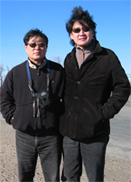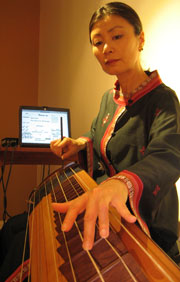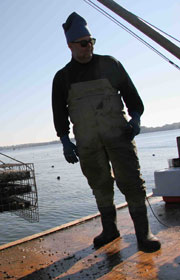Koryo Saram - The Unreliable People • Personnel
 |
left: Meredith Woo, Zarina Akisheva and Matt Dibble right: German Kim and Y. David Chung Meredith Jung-En Woo (executive producer, co-writer) is Dean of the College of Arts and Sciences at the University of Virginia. Her teaching and research interests include International Political Economy, East Asian Politics, and U.S.-East Asian relations. Before joining the University of Virginia, she taught at the University of Michigan, Northwestern University, Columbia University and Colgate University. In 1996 she was appointed by President Clinton to serve on the Presidential Commission on U.S.-Pacific Trade and Investment Policy. Y. David Chung (co-director, producer, co-writer) is an artist and filmmaker who has exhibited widely throughout the country and internationally at the Boston Museum of Fine Arts, the Corcoran Gallery of Art, the Whitney Museum of American Art, the Gwangju Biennale and the Tretyakov Gallery in Moscow. Chung began his career collaborating as a graphic artist on documentary films. His credits include “Surveillance, No Place to Hide” (HBO), “American Journey” (PBS), “Gardens of Paradise” (PBS), “The Forgotten People” (PBS), “Soldiers in Hiding” (HBO) and “Peace on Borrowed Time” (ABC). In 1996, he won the Best of Show Award with Matt Dibble for directing “Turtle Boat Head” at the Rosebud Film and Video Awards in Washington, DC. He received a National Endowment for the Arts Individual Fellowship in 1995. Chung attended the University of Virginia, the Corcoran College of Art and Design (BFA) and George Mason University (MFA). Chung is Associate Professor with the School of Art and Design and the former Director of the Center for Korean Studies at the University of Michigan. portfolio website Matt Dibble (co-director, director of photography, editor and co-writer) has worked in the field of documentary production since 1984. He first studied film at the Rhode Island School of Design, and his training as a visual artist greatly influences his approach to his work. He founded Dockyard to create original programming for television, as well as media installations for exhibitions. He has collaborated with dozens of producers on award winning programs as an editor and cameraman, and has tackled a wide range of documentary topics. He co-wrote and edited "The Mystery of Chaco Canyon," a one-hour show about the astronomically-aligned architecture of the ancient Pueblo Indians that aired nationally on PBS. "Rising Waters" explored the impact of global warming on the islands and communities of the South Pacific. Currently, Matt Dibble is working with producer Andrea Torrice on "New Metropolis," a Ford Foundation-funded 2-part program for PBS on the history and politics of suburban sprawl. German Kim (historical consultant) is one of the world’s leading experts on ethnic nationalities in Central Asia. He has written and edited a large number of books and published more than 150 papers, originally in his native Russian, but translated into Kazakh, English, Korean, German and Japanese. Of those there are two books that are particularly noteworthy, on the history of the Korean Diaspora. These are monumental works, and when the third volume is completed, they will be recognized as standard texts on the subject. Kim is Professor at the Kazakh National university named after Al-Farabi and he is the Head of the Department of Korean Studies. Japhet Asher (writer) is an Academy Award and Emmy Award nominated writer, executive and filmmaker. A graduate of New York University’s Tisch School of the Arts, Japhet began his career in documentaries, writing and producing his first television special, “Peace on Borrowed Time”, for ABC when he was just twenty-one years old. David Chung provided graphics on the film, a collaboration that culminated with the HBO documentary “Soldiers In Hiding” about Vietnam Veterans living in the wilds around the United States. Japhet went on to write and produce numerous film and television projects, notably MTV’s Emmy Award winning animated compendium “Liquid Television, which Japhet created.
Jin Hi Kim (composer, musician) is highly acclaimed as both an innovative komungo virtuoso and for her cross-cultural compositions. Ms. Kim has created the interactive pieces for the world's only electric komungo and MIDI computer system. Her work has been presented on Carnegie Hall, Lincoln Center for the Performing Arts, the Kennedy Center for the Performing Arts, Royal Festival Hall (London), Haus der Kulturen der Welt (Berlin), and many significant new music festivals and jazz festivals throughout the USA, Europe, Canada, South America, Russia, Asia, New Zealand and Australia.
Pooh Johnston (composer, musician) is a composer and multi-instrumentalist whose work with david chung spans two decades. Together with composer Charles Tobermann, they are responsible for three operas: "Seoul House", "5 Stations of the Cross" and "the Wishing Tree". He has also collaborated with David Chung and Matt Dibble on their many art/video installations providing the soundtracks. he currently resides on Virginia's Eastern Shore where he is involved in oyster aquaculture, is principal violist in the Orchestra of the Eastern Shore, and plays bass in a soul band. Johnston is a graduate fo the University of Virgnia. Steven Lee (consultant) is Assistant Professor in the English Department at the University of California, Berkeley. He recieved his Ph.D. in the Modern Thought and Literature program at Stanford University. His dissertation traces the interactions of American and Soviet conceptualizations of difference, focusing on how the Cold War shaped ethnic literatures and multiculturalism in the U.S. A summa cum laude graduate of Amherst College, in 2001-02 he was among the first-ever group of Fulbright students to be sent to the Central Asian Republics. His research project, based in Almaty, Kazakhstan and Tashkent, Uzbekistan, compared Soviet Korean and Korean American literature and art, paying particular attention to Soviet nationality policy.
|

